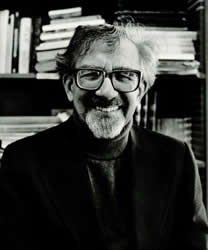

|

|
IN MEMORIAM
Benjamin Mather Woodbridge Jr.
Professor of Portuguese, Emeritus
UC Berkeley
1915 — 2007
Benjamin Mather Woodbridge Jr., professor of Portuguese, emeritus, died at the Salem Lutheran Home in Oakland on March 18, 2007. His retirement in 1982 brought to a close an academic career of unstinting dedication to the teaching of his students, of service to his department at the University of California, Berkeley, and the Bay Area Portuguese community, and of an astonishing record of editorial board responsibilities for major research journals in the fields of Romance languages and Latin American studies.
Born on March 31, 1915, in Austin, Texas, Ben was raised in an English-French bilingual family in Portland, Oregon, where his father taught foreign languages at Reed College. He graduated from Washington High School there in 1932 and entered Reed immediately, taking a B.A. in 1936. The strength of his preparation and his language abilities allowed him immediate and easy entry to the Romance languages M.A. program at Harvard University. He earned that degree in one year and continued directly into Harvard’s doctoral program, also in Romance languages. Those studies took him to the Université Libre de Bruxelles, Belgium, in 1939, only to see that academic world shattered in 1940 by the German invasion and his studies interrupted under the pressures of the war years. He taught foreign languages at the University of Georgia in 1940-1942 and accepted a teaching fellowship at the União Cultural Brasil-Estados Unidos, São Paulo, Brazil, in 1943-1945, during which years he met and married Maria de Lourdes Prestes d’Albuquerque. He returned to the United States in 1945, bringing his wife and two children, Michael and Maria Lucia, when he accepted a post as instructor in Romance languages at the University of Texas. In the fall of 1946, he was finally able to return to the doctoral program at Harvard and finished the degree in 1949, with a dissertation on the noted Brazilian author Machado de Assis.
In that year, Lesley Byrd Simpson, then chair of Berkeley’s Department of Spanish and Portuguese, was faced with the postwar growing interest in matters Brazilian and Portuguese while Berkeley’s offerings in the field had somehow, in his words, become “makeshift, planless, and heterogeneous.” Through his contacts at Harvard, Simpson knew that Ben had just finished his degree, and Simpson, an ex-bomber pilot, spoke strongly, as he was wont to do, to the young man, suggesting that he come west immediately and take responsibility for the Portuguese program. Ben did, bringing the family and settling initially in Berkeley, to start his 33 year unbroken academic career as a Berkeley faculty member.
He began in 1949 with the title of instructor, as most did in those years. He was brought into the professorial ranks in 1951 as an assistant professor, promoted to associate professor in 1959 and then to professor in 1978. He served as acting chair of the department in 1973-74, and, as a Berkeley participant, took the directorship of the City University of New York’s study program in Lisbon in 1967-68.
Throughout his career Ben maintained a research interest in Machado de Assis and in the textual tradition of the sixteenth-century Portuguese poet and playwright Sá de Miranda; but a dissatisfaction with the trends in literary criticism around him and a disinclination to conform to them led him virtually to cease publishing his own research and to devote his efforts to teaching and to the duties of managing assistant editor of the Berkeley-based journal Romance Philology (1951-1982) and of contributing editor for the Handbook of Latin American Studies (1965-1982). Well over 100 articles, reviews, notes, and, in the words of the formidable Yakov Malkiel, “magisterial bibliographies” were supplied to those and other journals over the years.
In his teaching, Ben carried the Portuguese program virtually alone for many years, teaching more than the normally expected number of courses each term. One ad hoc review committee noted that “as an instructor of undergraduates, as a teacher of graduate studies, as a director of dissertations, testimony to his excellence is ample and uniformly convincing. He has been not merely a ‘star’, a popular instructor, but a teacher of teachers, a master-teacher, a trainer of scholars at the highest level”—an assessment based on statements by an impressive number of established scholars who acknowledged their deep indebtedness to Ben and to the training they received from him. He was, in fact, devoted to the training of his students to the point that their papers were returned with comments and editorial guides for writing that often seemed almost as extensive as the students’ own writing.
After an amicable divorce from his first wife in the mid-1950s, Ben married Mary Sylvia Neves in 1960. The daughter of an established family in the California Portuguese community, Mary encouraged him into a continual involvement in the promotion of educational opportunities, through educational grants from the Oakland-based Luso-American Education Foundation, for the children of long-resident California families of Portuguese background and for those of recent immigrants. It was for the success of that work as much as for his dedication to the welfare and expansion of the program of Portuguese studies at Berkeley that the president of Portugal acknowledged his efforts on behalf of Portuguese culture and the Portuguese community by awarding him the rank of commander in that nation’s Order of Prince Henry the Navigator shortly following his retirement. Ben was very pleased by that recognition of his work and thought that “at least some good would remain from it all.” Indeed it has, as Berkeley’s program of Portuguese studies has continued to grow and flourish.
Benjamin Woodbridge is survived by his children, Michael, of Oakland, and Maria Lucia, of Walnut Creek, California.
Charles Faulhaber
Arthur Askins
John Polt
Candace Slater